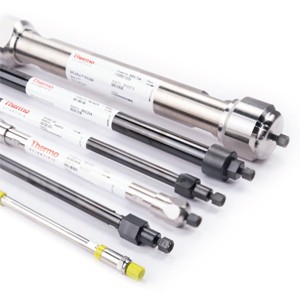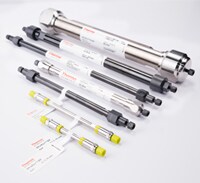Thermo Scientific HPLC columns for characterizing biopharmaceutical molecules

Get the innovative, high resolution, analytic HPLC columns, to detect, characterize and quantify structural variants and modifications in proteins, mAbs therapeutics and other biomolecules.
The broad range of HPLC columns provides users with the needed resolution to achieve a wide range of analytical tasks, such as:
- Purity and titer analysis
- Aggregation analysis
- Charge variant analysis
- Clips and truncations
- Light chain/heavy chain analysis
- Peptide mapping
- Glycan profiling
- Oligonucleotide separations
- Post-translational modification analysis (amino acid substitutions/truncations, deamidation, phosphorylation, etc.)
Innovative, high resolution, fast, reliable, reproducible
Characterization of mAbs and their aggregates, fragments, and titers
Extensive development of protein and monoclonal antibody (mAb) therapeutics currently underway requires innovative and efficient tools that characterize and quantify structural variants and modifications, monitor product stability and demonstrate safety and efficacy. These specifically designed Thermo Scientific™ MAbPac™ columns provide a full range of high resolution, high efficiency mAb analyses by LC and LC-MS.

Exceptionally high resolution of +1 and -1 nucleic acids, including isomers
These columns are used in HPLC and UHPLC experiments. What sets Thermo Scientific™ DNAPac™ columns apart from the rest is their ability to provide exceptionally high resolution separations of nucleic acids (+1 and -1), including isomers, which is not possible with reversed phase columns. The larger i.d. columns are popularly used for the small scale purification of nucleic acids.

Exceptionally high resolution, high efficiency protein characterization
High resolution and high efficiency set these columns apart. For excellent analytical characterization of proteins, we offer a full range of Thermo Scientific™ affinity, ion exchange, reversed phase, hydrophobic interaction, and size exclusion columns for your protein sample.

